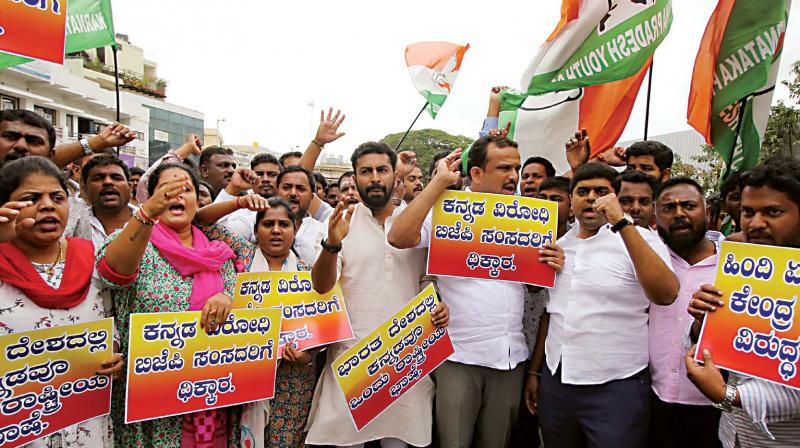K’taka erupts, says it’s a land of many tongues

Bengaluru: Union Home Minister Amit Shah’s comments on making Hindi a common official language in the country has kicked up a storm between different political parties in both Hindi speaking and non-Hindi speaking states.
Last Saturday, Mr Shah appealed to the people to accept Hindi as the common national language as a unifying force in a multilingual, multi-ethnic and multicultural nation celebrating its unity in diversity as part of his government’s vision of ‘One Nation, One Language’.
Almost all non-Hindi-speaking states, including Karnataka, Andhra Pradesh, West Bengal, Tamil Nadu, Kerala and Puducherry, have registered their protest.
Chief Minister B.S. Yediyrappa urged the Centre not to rethink the three-language formula that includes Hindi, English and a regional language. They also urged the Centre not to stir controversies based on ‘emotive’ issues such as language as Indian Constitution clearly respects the country’s diversity and recognizes all the languages spoken by a large section of them as official languages.
This is not for the first time that the Centre has stoked a controversy on the use of Hindi as a common language. Since the BJP government came to power in 2014 at the Centre, it has tried to introduce Hindi as an official language by sending a circular to all ministries, departments, PSU banks and social media accounts.
After the BJP returned to power in 2019, the HRD ministry in June made a draft National Education Policy which proposed Hindi as a mandatory language under three-language formula for school education.
Hindi imposition takes political turn
The language issue has taken an acrimonious and political turn in the state, when it is headed to face by-polls in 17 assembly segments which are crucial for the survival of BJP government. The proposal for a separate ‘State Flag’ was also rejected by the Centre.
Political parties are whipping up Kannada pride at a time when over 28,000 Kannada schools are facing the threat of closure.
As per the 2011 census, as many as 4,37,06,512 people speak Kannada, while 66,18, 324 speak Urdu. Telugu stands at the third place with 35,69,400 speakers followed by Tamil with 21,10,128 speakers and Marathi with 20,64,906 speakers. Hindi stood sixth with 20,13,364 speakers followed by Konkani with 7,88,294 speakers and Malayalam 7,74,057, Gujarati 1,14,616, Kodava 1,10,508, Bengali 87,963, Odiya 64,119, Sindhi 16954, Punjabi 25,981, Nepali 19274, Manipuri 4103 and Kashmiri with 3388 speakers.
Minister Suresh Kumar defends Hindi
“Hindi is the fifth most spoken language in the world. The language which is part of Indo-Aryan group is also the most preferred by a majority in the country. Hindi speakers can be found in Uganda, Yemen, Bangladesh, Mauritius and South Africa,” said S. Suresh Kumar, Primary and Secondary Education Minister
‘Shah’s comments dictatorial’
“Amit Shah’s comments on common official language shows his dictatorial attitude. The policy of ‘One language, One Nation’ is against the spirit of Indian Constitution based on the social, secular, democratic and republic principles. Constitution has recognized 22 languages including Kannada as official language of the country. Under the guise of patriotism, Amit Shah should stop his policy of language discrimination. It is better to have a two-language formula for the country rather than a three-language policy. All citizens of the nation need equal education, rights and opportunities,” said S G. Siddharamaiah, chairman, Kannada Development Authority
Kannadigas should form own state
“Language is our culture, our identity and our sign of unity within the state. We don’t want any emotional play by the Centre particularly with Kannadigas, We love our language Kannada as much as we like our motherland India. Pluralism is our country’s biggest strength and unity in diversity in the nation’s cultural identity. If Centre and Home Minister are taking steps to erase such an identity since its assuming office, while all 22 languages in the Constitution’s Eighth Schedule should be nurtured. Picking only Hindi for promotion will threaten national integrity. If this continues, we will be forced to come out of Republic of India and to constitute our own independent nation to protect our culture and identity”, said V.P. Niranjanaradhya, senior fellow and programme head, Centre for Child and the Law National Law School of India University.
Kannada is a way of life
Kannada has a history of 2,000 years. It’s a way of life, culture and identity of people of Karnataka. The concept of one nation and one language is totally unscientific and unacceptable to the country where multi ethnic people live, said K.S. Shivaram, City unit Secretary of Mysuru District, Kannada Sahitya Parishath.
...but experts say hindi essential
Except North East and South Indian States, Hindi is spoken in the country by a majority people of the nation and it is greatly influenced by Persian language. As India is becoming fastest growing economy after China, knowledge of learning Hindi, the local language has become essential to conduct business, liaison work, advertising and management. Like Urdu, learning Hindi opens the doors to learning other languages and getting job opportunities in India and Asian countries, said education experts.

